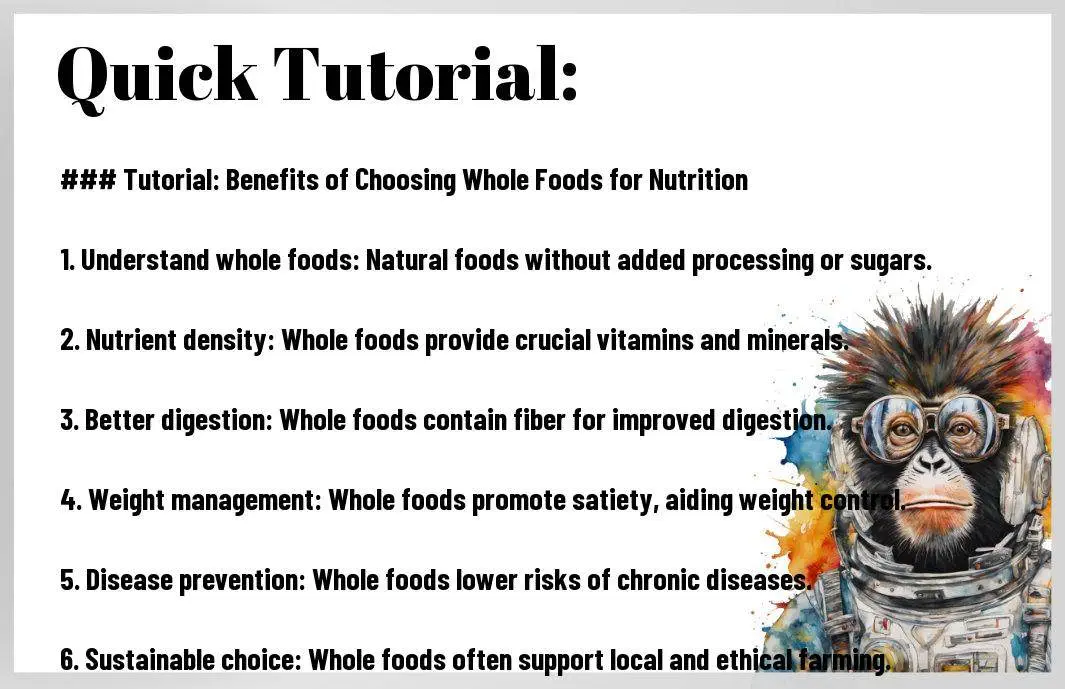What Are The Benefits Of Choosing Whole Foods For Nutrition And Healthy Diets?
Opting for whole foods can remarkably elevate your nutrition and diet, offering a myriad of benefits that processed foods simply cannot match. By focusing on unrefined and minimally processed ingredients, you can enhance your overall health, elevate your energy levels, and improve your well-being. In this post, you will discover why incorporating whole foods into your meals not only nourishes your body but also boosts your vitality and paves the way for a sustainable, healthy lifestyle.
Understanding Whole Foods
Before delving into the benefits of whole foods, it’s necessary to grasp what they really encompass. Whole foods are natural and minimally processed foods that retain their original state, offering a plethora of nutrients and health advantages.
Definition of Whole Foods
You can define whole foods as foods that are in their natural state, free from artificial substances, and generally unaltered from their original form. This includes fruits, vegetables, whole grains, nuts, seeds, and proteins such as meat and fish.
Comparison to Processed Foods
Whole Foods vs Processed Foods
| Whole Foods | Processed Foods |
|---|---|
| Minimal processing | Highly processed |
| Rich in nutrients | Low in nutrients |
| No artificial additives | May contain preservatives and chemicals |
| Supports overall health | Can contribute to health issues |
Some individuals may not realize the major differences between whole foods and processed foods. Whole foods typically deliver a high concentration of vitamins, minerals, and fiber, while processed foods often lack these necessary nutrients, leading to poor dietary choices.
Whole Foods vs Processed Foods Overview
| Characteristics | Impact on Your Health |
|---|---|
| Natural Ingredients | Promote better digestion |
| High Fiber Content | Aid in weight management |
| Natural Sugars | Stabilize blood sugar levels |
| Whole Grains | Improve heart health |
Whole foods offer a wealth of advantages that processed foods often lack. By choosing whole foods, you are investing in higher quality nutrition that can optimize your health and enhance your overall well-being.

Nutritional Benefits
Even when considering your overall health, choosing whole foods is a game changer. They are packed with vitamins, minerals, and antioxidants that support your body’s imperative functions. Unlike processed foods, which often lack vital nutrients, whole foods provide the raw energy and complex compounds necessary for a balanced diet, enabling you to feel your best and function optimally throughout the day.
Rich in Essential Nutrients
On your journey to better health, whole foods offer an abundance of imperative nutrients that many processed foods lack. These nutrients, such as vitamins A, C, E, and K, along with minerals like potassium, magnesium, and calcium, are vital for your body’s performance. By prioritizing whole foods, you ensure that your diet is rich in these necessary components, enhancing your overall well-being.
Higher Fiber Content
If you’re looking to improve your digestion and maintain a balanced diet, whole foods are especially beneficial due to their higher fiber content. This natural fiber not only keeps your digestive system functioning smoothly but also helps you feel satisfied longer, reducing the temptation for unhealthy snacks.
Fiber plays an imperative role in your diet, as it aids digestion and supports a healthy gut. By incorporating whole foods like fruits, vegetables, legumes, and whole grains, you increase your fiber intake, which can help regulate blood sugar levels and lower cholesterol. Additionally, a fiber-rich diet can promote weight loss by keeping you feeling full and satisfied, making it easier for you to stick to your healthy eating goals.
Weight Management
Now that you are looking at weight management, incorporating whole foods into your diet can significantly contribute to your goals. These nutrient-dense options not only support your body’s needs but also help you achieve and maintain a healthy weight more effectively.
Satiety and Portion Control
To enhance your weight management journey, whole foods are rich in fiber, which increases feelings of fullness and helps you manage portion sizes. When you feel satisfied, you are less likely to indulge in unnecessary snacks or overeating during meals.
Reduced Caloric Intake
Caloric intake plays a crucial role in weight control, and choosing whole foods can naturally lower the number of calories you consume. Because whole foods are less processed, they often have fewer added sugars and unhealthy fats that contribute to excess caloric intake.
With whole foods, you benefit from fewer empty calories and a greater volume of nutrients. By focusing on fruits, vegetables, whole grains, and lean proteins, you can eat larger portions while consuming fewer overall calories, allowing you to feel full without exceeding your daily caloric limits.
Disease Prevention
Many studies indicate that choosing whole foods can significantly reduce your risk of various diseases. Whole foods, rich in vital nutrients and antioxidants, help maintain your body’s natural defenses, allowing you to ward off illnesses more effectively. By nourishing your body with wholesome ingredients, you are not only improving your overall health but also potentially extending your lifespan and enhancing your quality of life.
Anti-Inflammatory Properties
Any diet rich in whole foods is naturally anti-inflammatory, as these foods typically contain high levels of antioxidants, fiber, and phytonutrients. By incorporating fruits, vegetables, whole grains, nuts, and seeds into your meals, you can help reduce inflammation in your body. This can lower your risk of inflammatory-related diseases, such as arthritis or heart disease, allowing you to feel more energetic and healthier.
Lower Risk of Chronic Diseases
To effectively lower your risk of chronic diseases, a diet centered on whole foods is key. These foods help regulate weight, cholesterol levels, and blood pressure, all important factors in preventing conditions such as type 2 diabetes, heart disease, and certain cancers.
Diseases like heart disease and diabetes can often be linked to poor dietary choices, which is where whole foods play a vital role. By focusing on whole, nutrient-dense foods, you can improve your metabolic health, enhance your immune system, and maintain a healthy weight. This proactive approach empowers you to make significant, positive changes in your life while safeguarding your long-term health.
Incorporating Whole Foods into Your Diet
To successfully incorporate whole foods into your diet, start by gradually replacing processed items with natural options. Focus on fresh fruits, vegetables, whole grains, nuts, and seeds, while keeping meals varied and exciting. This transition not only enhances nutritional value but also fosters a deeper connection to the food you consume.
Meal Planning and Preparation
Clearly, meal planning is crucial for maintaining a healthy diet. By outlining your meals for the week and preparing ingredients in advance, you can save time, minimize food waste, and ensure that whole foods remain a priority in your diet. Consider batch cooking and portioning meals to stay organized and on track.
Practical Tips for Eating Whole Foods
Your journey to incorporating whole foods can be streamlined with some practical tips. Start by reading labels to identify whole food items, stocking your pantry with versatile staples, and setting aside time for shopping and prep. Embrace seasonal produce for optimal freshness and flavor.
- Keep snacks handy, like nuts and fruits.
- Experiment with new recipes using whole ingredients.
- Stay hydrated with water instead of sugary drinks.
Thou can create a satisfying and nourishing lifestyle.
For instance, making small changes can lead to lasting habits in eating whole foods. Commit to selecting one or two whole ingredients each week to integrate into your meals. Enjoy the process of trying new flavors and textures, which will heighten your appreciation for nutritious food.
- Join local farmer’s markets for fresh produce.
- Choose whole grains over refined options whenever possible.
- Prepare meals in advance to avoid last-minute unhealthy choices.
Thou can find joy in nurturing your body through whole foods.
Addressing Common Misconceptions
Not everyone understands the full value of whole foods, often leading to misconceptions that may deter you from making healthier choices. Many believe that these foods are only for the affluent or that they require extensive preparation time, which can discourage you from embracing them in your diet. By addressing these misconceptions, you can make informed decisions and appreciate the multitude of benefits whole foods have to offer.
Whole Foods Are Too Expensive
Expensive doesn’t always mean out of reach. While it’s true that some specialty organic products can be pricier, many whole foods, such as fruits, vegetables, legumes, and grains, are often affordable and available at local markets. Buying seasonal produce or bulk items can significantly reduce costs, allowing you to enjoy a nutritious diet without financial strain.
Whole Foods Are Time-Consuming to Prepare
You may feel overwhelmed by the thought of preparing whole foods, but the reality is less daunting. Many whole foods can be quick and easy to incorporate into your meals with minimal prep time.
Whole foods can actually streamline your cooking process. With simple chopping, steaming, or roasting, you can have nutritious meals ready in no time. Moreover, batch cooking on weekends can save you effort during the week, making it easier to add whole foods into your daily routine. Embracing simple recipes that highlight whole ingredients can transform your culinary experience, allowing you to enjoy the benefits of a healthy diet without excessive time commitment.
Summing up
Presently, choosing whole foods for your nutrition and healthy diets provides a range of benefits that can enhance your overall well-being. Whole foods are less processed and packed with vital nutrients, which means you receive more vitamins, minerals, and fiber in your diet. By focusing on whole foods, you can support better digestion, maintain healthy weight, and reduce the risk of chronic diseases. Additionally, they can improve your energy levels and mood, making you feel your best. Ultimately, incorporating whole foods into your meals can lead to a healthier, more balanced lifestyle.
